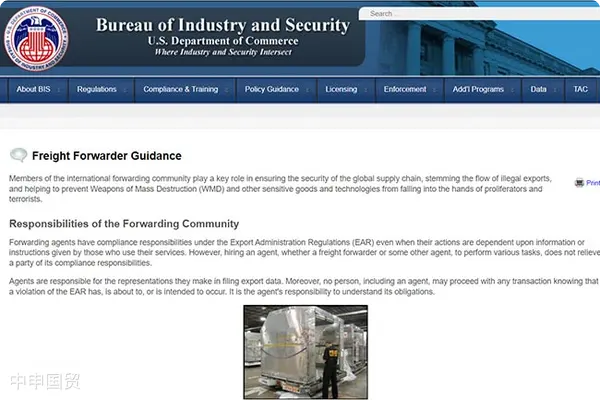- Shanghai Zhongshen International Trade Co., Ltd. - Two decades of trade agency expertise.
- Service Hotline: 139 1787 2118
On October 6, 2023, the Bureau of Industry and Security (BIS) of the US Department of Commerce updated its entity list, adding several Chinese logistics enterprises. This move undoubtedly adds new uncertainties and risks to the global logistics industry. This article will discuss in detail the update of the entity list, the relevant regulatory content, and the cautious response strategies of the logistics industry when facing export control risks.
I. Background of Entity List Updates: New Developments in U.S. Export Controls
(1) Expansion of the Entity List and Its Underlying Political-Economic Factors
On October 6, 2023, the Bureau of Industry and Security (BIS) published a new Entity List determination in the Federal Register, adding 49 entities, including 42 located in China. These entities were alleged to have supplied U.S.-origin integrated circuits to consignees related to Russias defense sector after March 1 of this year. The customs codes for these integrated circuits were 854231, 854232, 854233, and/or 854239. According to the U.S. Export Administration Regulations (EAR), since September 15, 2022, exports or re-exports of these items to Russia or Belarus require an export license.
Notably, among the 42 newly added Chinese entities, at least six are logistics companies. This indicates that U.S. sanctions against Chinas logistics industry are intensifying.
(2) Impact on Chinese Logistics Companies
Entities included in the Entity List will face stricter scrutiny and restrictions when engaging in trade with the U.S., posing certain obstacles and challenges to the normal operations of the logistics industry.
Although logistics companies typically do not directly participate in trade activities, they play a critical role in the supply chain.
In the past, several Chinese logistics companies have been added to the Entity List for violating U.S. export controls. For example, in May 2020, a Chinese logistics company was listed for supporting the Chinese military; in March and September 2023, multiple Chinese and Hong Kong logistics companies were listed for trade activities related to Iran.
Additionally, even if logistics companies only provide freight forwarding services, they must still comply with EAR regulations. According to BIS guidance, freight forwarders also have compliance obligations under the EAR. Violations may result in penalties, license revocation, export bans, and other consequences.

II. Analysis of Regulatory Content
(1) Key Content and Points of the EAR Regulations
根據EAR第746.5款的相關規定,美國嚴格限制了向俄羅斯或白俄羅斯出口、再出口或在兩國境內轉移的物項。在這一條款中,EAR第746節附件4中所列的受EAR管轄物項需申請出口許可證。
For details, see:marine plant products (except chilled and frozen)
(2) Protection of U.S. National Security and Foreign Policy Interests
EAR Section 744.11(b) outlines criteria for Entity List adjustments, focusing on entities that may pose a threat to U.S. national security or foreign policy interests. These criteria, defined broadly and multidimensionally, highlight the strategic orientation of U.S. export controls.
III. How to Address U.S. Export Control Risks?
Logistics companies should familiarize themselves with the Know Your Customer and Red Flag guidance to ensure transactions with compliant clients.
BIS provides logistics and freight forwarders with common Red Flags:
Illogical Shipping Routes:If the shipping route does not align with economic or commercial logic—for example, if the path deviates significantly from the final destination—this may be a red flag.
Mismatched Transaction Characteristics:When product specifications, quantities, or destinations do not align with the buyers business, needs, or practices.
Unverifiable Information:When customer or transaction party details (e.g., address, contact information) cannot be verified or appear falsified.
Avoidance of Providing Information:If the customer or transaction party avoids disclosing details about the end-use or end-user of the goods.
Use of Intermediaries:The use of intermediaries (especially in transactions where they are not typically used) may be intended to conceal the true end-user or end-use.
Unusual Payment Methods:For example, cash payments, overpayments, or payments made through third parties.
Transaction counterpart on sanctions list:When one party to the transaction, including buyers, sellers, freight forwarders, banks, etc., appears on international sanctions lists.
Abnormal behavior of transaction counterpart:For example, customers show no sensitivity to price, lack interest in technical specifications or other details, or refuse normal after-sales services.
Abnormal handling of goods:For instance, the packaging of goods doesnt match the transportation method or destination, or the shipped products are incompatible with the technological level of the destination country.
Avoiding face-to-face interaction: Customers are unwilling to meet in person or engage in normal business discussions.
Rapid order changes:Frequent modifications to orders or shipping details without reasonable explanation.
Red Flags original text: Red Flag Indicators
Facing the constantly updated Entity List by the U.S. Department of Commerces Bureau of Industry and Security, the global logistics industry, especially Chinese logistics companies, should strengthen compliance awareness to avoid potential legal and economic consequences.
Related Recommendations
Core Business
Contact Us
Email: service@sh-zhongshen.com
Related Recommendations
Contact via WeChat

? 2025. All Rights Reserved. 滬ICP備2023007705號-2  PSB Record: Shanghai No.31011502009912
PSB Record: Shanghai No.31011502009912








